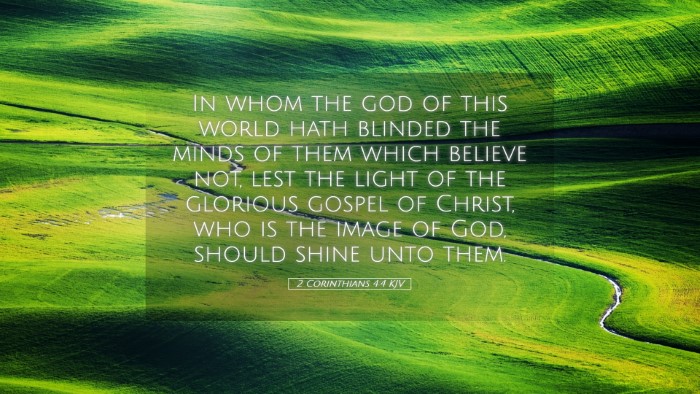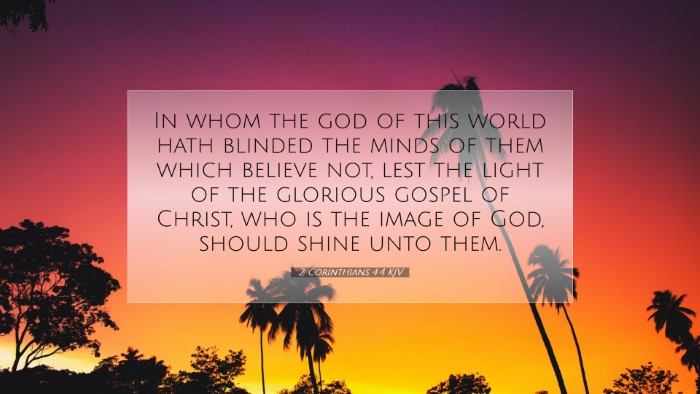Commentary on 2 Corinthians 4:4
Bible Verse: 2 Corinthians 4:4 - "In whom the god of this world hath blinded the minds of them which believe not, lest the light of the glorious gospel of Christ, who is the image of God, should shine unto them."
Introduction
This verse encapsulates a critical aspect of spiritual warfare, highlighting the opposition encountered by the message of the Gospel. The Apostle Paul confronts the realities of a world influenced by the "god of this world," illustrating the obfuscation of truth experienced by those who reject Christ. In this commentary, we will delve into various perspectives drawn from esteemed public domain commentaries, exploring the theological, practical, and pastoral implications of this verse.
The God of This World
Matthew Henry emphasizes the title "god of this world," noting that it refers to Satan, who exercises significant influence over the unredeemed. Henry points out that this power is not absolute; Satan's dominion is restricted to those who choose to live in rebellion against God. He asserts that this dominion manifests through the blinding of spiritual understanding, leading individuals away from the truth of the Gospel.
Albert Barnes reinforces this perspective, indicating that the phrase indicates a strong moral and spiritual state of the world. Barnes suggests that the god of this world not only blinds the minds of unbelievers but also fosters a landscape where materialism and secularism prevail, hindering true understanding of divine matters.
The Blinding of the Mind
The act of blinding mentioned in this verse is central to understanding the spiritual condition of those who do not believe. Adam Clarke elucidates that this blindness is not merely an intellectual deficiency, but a profound moral and spiritual incapacitation that leads people to reject the illumination that comes from Christ. Clarke notes that this blindness often results from willful ignorance — individuals choose not to see the truth presented before them.
Matthew Henry expands on this notion, suggesting that the blinding is also a tactic employed by Satan to obscure the clarity of the Gospel. It serves as a barrier preventing people from recognizing their need for salvation and the glory of the Gospel's message. Henry reflects on the nature of human sin, drawing from scriptural passages to illustrate that apart from divine intervention, individuals remain in darkness.
The Light of the Gospel
Amidst the bleakness of spiritual blindness, the "light of the glorious gospel of Christ" signifies hope and revelation. Albert Barnes describes this light as the knowledge of God's grace made manifest through Christ. It is a revelation of the character of God, which is essential for believers to comprehend their salvation's depth.
Adam Clarke emphasizes that the light of the Gospel shines brightly, intended to reach all who are willing to see. Clarke underscores the importance of evangelistic efforts, noting that the proclamation of this light is crucial for dispelling darkness. He argues for the transformative power of the Gospel, capable of altering lives and reshaping destinies for those who respond to its invitation.
Implications for Believers
- Spiritual Warfare: This verse starkly illustrates the reality of spiritual warfare. Believers must understand the forces at work against the clarity of the Gospel and engage in prayer and evangelism to combat this blindness.
- Evangelism: The implications for outreach are profound. The church must actively participate in the mission of shining the light of the Gospel into dark places, seeking to enlighten those blinded by the god of this world.
- Faith in Action: The message of hope reminds believers that while the enemy may blind, God empowers His followers to be instruments of revelation, showing forth His light through both life and proclamation.
Conclusion
2 Corinthians 4:4 is a poignant reminder of the ongoing battle for the souls of humanity. The influence of the "god of this world" serves to remind Christians of their role in the divine plan to bring light into darkness. Through thoughtful engagement with scripture, fellowship, and truthful evangelism, believers are called to overcome the spiritual blindness affecting many. The glorious light of Christ shines not only for personal salvation but as a beacon of hope for the world, exemplifying God's heart for all to come to knowledge of the truth.


